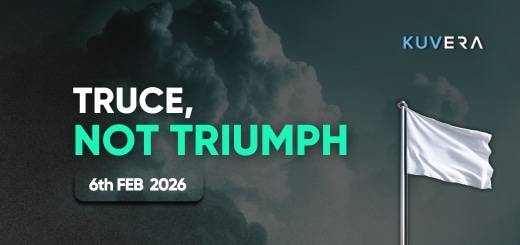In 1979, a civil engineer in Uttar Pradesh decided to formally establish his business after taking up contracting work for nearly two decades. Over the next two and half decades, the engineer and his two sons rapidly expanded their business and became the biggest conglomerate emerging out of the northern state that isn’t really known for, well, business.
They set up cement factories, built hydropower dams and coal-fired electricity plants, opened hotels, laid highways, constructed hospitals and schools, acquired vast swathes of land to construct apartments and villas, and even gained international fame by hosting India’s first and only Formula One race.
If you still haven’t guessed it, we are talking about Jaiprakash Gaur, the engineer who founded the Jaypee Group. Gaur is now 94 years old and long retired. But he wouldn’t have wanted to go things the way they have gone over the past decade. The business empire that he built has unraveled. Jaypee’s cement plants, hospitals, power plants, real estate all sold to different companies as they struggled to pay off their debts they had taken up to build their empire.
And now, Jaypee’s crown jewel is set to be sold and Gaur’s elder son and heir apparent, Manoj, is cooling his heels behind bars. This week, billionaire Gautam Adani’s eponymous conglomerate edged out mining and metals tycoon Anil Agarwal’s Vedanta in a high-stakes bidding war for the Jaypee Group’s flagship company Jaiprakash Associates.
The bidding war was part of the insolvency proceedings for Jaiprakash Associates, which owes Rs 55,000 crore of debt to lenders. On offer were Jaypee’s remaining cement plants, power projects, and some other assets. About a half-dozen companies entered the fray—Adani, Vedanta, Dalmia Bharat, Jindal Power, PNC Infratech, and Manoj Gaur himself.
After months of wrangling, the creditors voted for Adani Enterprises, even though Vedanta’s offer was larger on paper. The reason? Adani’s bid of roughly Rs 13,500 crore included more money upfront and a faster payout within a couple of years whereas Vedanta’s higher Rs 17,000 crore proposal stretched over five long years, according to media reports.
Meanwhile, the Enforcement Directorate arrested Manoj Gaur last week and a court sent him to custody this week. Gaur, who tried a last-ditch gambit with a settlement offer of around Rs 18,000 crore to reclaim his family’s empire before withdrawing it, was arrested over allegations that he masterminded a Rs 14,599-crore fraud.
The arrest was related to another Jaypee Group business—real estate. The group’s sprawling Jaypee Wish Town township in Noida has turned into a ghost town of half-constructed towers over the past decade, leaving thousands of homebuyers in the lurch. While the township is now being finished by Suraksha Group after taking it over through a separate insolvency process, the ED now alleges that funds collected from homebuyers were diverted to other entities – from a group trust to the company’s hospital and even the sports venture behind its Formula 1 racetrack.
So, what’s next? For all practical purposes, the Jaypee Group is all but finished. It will be near-impossible for the Gaurs to come back from this and rebuild their empire.
As for Adani, its proposal will now go to the National Company Law Tribunal for approval. When it sails through, this deal will mark another big win for India’s second-richest man. It will not only boost his Ambuja-ACC cement operations, which is already the second-biggest in India after Aditya Birla Group’s UltraTech, but also his other infrastructure businesses.

Power & Debt
Manoj Gaur is not the only once-mighty businessman whose fortunes have turned around. Another one is Anil Ambani, the younger son of Dhirubhai Ambani and brother of India’s richest man, Mukesh Ambani.
Gaur and Anil Ambani share several similarities. Both inherited large businesses from their father and expanded them further. Both operated mostly in infrastructure businesses. Both relied mostly on debt to power their plans. And when the going got tough, both failed to return their loans and ended up selling several assets.
Anil Ambani once led an empire that included Reliance Power, Reliance Infrastructure, Reliance Communications, and Reliance Capital. Over the years, many of his businesses have been either acquired by other companies or are languishing. And he himself is facing several legal and regulatory probes. This week, his problems compounded.
The Enforcement Directorate froze properties linked to companies of the Reliance Anil Ambani Group worth Rs 1,452 crore, or about $164 million, as part of a money-laundering probe. This comes after the financial crime-fighting agency attached assets worth Rs 7,500 crore ($853 million) in early November. These properties include 132 acres of land within the Dhirubhai Ambani Knowledge City in Navi Mumbai, Ambani’s house in Mumbai’s Pali Hill, a Reliance Centre property in Delhi, and other properties in Delhi, Noida, Ghaziabad, Mumbai, Pune, Thane, Hyderabad, and Chennai.
Overall, the ED has now clamped down on over $1 billion worth of Ambani’s properties.
The latest seizures were made in a case involving alleged diversion and laundering of public funds by Reliance Home Finance Ltd and Reliance Commercial Finance Ltd. The previous seizures related to cases involving Reliance Communications over the alleged diversion of loans taken from YES Bank between 2017 and 2019.
The ED alleges that Reliance Communications and its group companies diverted more than Rs 13,600 crore. It said that loans taken by one entity from one bank were utilized for repayment of loans taken by other entities from other banks, transfer to related parties, and investments in mutual funds. “This was in contravention to the terms and conditions of the sanction letter of the loans,” the agency said.
Reliance Communications, which was once one of India’s largest telecom operators and was admitted into insolvency in 2019, is also facing a separate probe from the Serious Fraud Investigation Office.
On its part, Reliance Communications says it is cooperating with the authorities. The group also says that the probes into Reliance Communications won’t impact Reliance Infrastructure and Reliance Power. Still, Anil Ambani is unlikely to get out of this mess easily. And that will certainly affect his remaining businesses.
IT & Data…
Moving on from failed businesses of the past to the new and exciting businesses of the future, India’s biggest IT company is moving full throttle into the artificial intelligence and data centre arena.
Last month, while announcing its quarterly results, Tata Consultancy Services had revealed its plans to set up a new entity to build AI-ready data centres with a capacity of 1-gigawatt in India. This plan, it said, would cost as much as $6-7 billion, and help it become “the world’s largest AI-led technology services company”.
At the time, critics said the ambitious plan had limited overlaps with its core IT services company and that it could put pressure on the company and its stock. But Tata Group company remains undeterred.
This week, TCS announced the first concrete step in achieving those ambitious goals. It said it is forming a Rs 18,000 crore (about $2 billion) joint venture with American private equity firm TPG to develop AI data centres.
TPG will invest up to $1 billion over the next few years and get a stake of up to 49%. TCS will contribute the remaining and hold 51% of the JV, called HyperVault AI Data Centre. The JV will also raise $4.5-5 billion through debt, TCS said.
To be sure, TCS hasn’t yet offered any details on the number or location of the planned data centres. But the quick formation of the JV does highlight its seriousness. And, of course, TCS isn’t alone in setting up data centres in India.
Mukesh Ambani-led Reliance Industries plans to set up a 1-GW AI data centre in Andhra Pradesh. Reliance is already building an equally large data centre in Jamnagar, where it already operates a massive refinery. Global tech giants such as Microsoft and Amazon are investing billions into building data centres in India. And Google last month announced a $15-billion investment over five years to create an AI data centre in Andhra Pradesh.
So, it’s not really a surprise that TCS is moving forward with its data centre plans. Will it affect the company’s performance and its stock? It certainly will. All we hope is it affects the company and its stock positively!
…And AI
Staying in the world of technology, the global poster child of AI—chipmaker Nvidia—has been in news for more reasons than one for the past few days even as a debate rages on an AI bubble. It announced its quarterly earnings this week, disclosed investments in other companies, and at least two major investors sold their Nvidia stock in recent days.
The chipmaker’s revenue during the three-month period ended in October surged 62% from a year earlier to about $57 billion, exceeding Wall Street expectations. It said it had $500 billion in bookings for its advanced chips through 2026 and brushed aside concerns of an AI bubble and its comparison with the dotcom boom and bust 25 years ago.
“There’s been a lot of talk about an AI bubble. From our vantage point, we see something very different,” Nvidia CEO Jensen Huang said on a call with analysts. “We’re everywhere from cloud to on-premise to robotic systems, edge devices, PCs, you name it. One architecture. Things just work. It’s incredible.”
Huang isn’t wrong. Nvidia is, indeed, everywhere. That’s the reason its shares have soared in recent years and it is now the world’s most valuable company with a market cap of $4.4 trillion currently. And its latest results send a clear message to skeptics: this AI boom has real substance behind it.
But then, it makes us wonder why are some marquee investors selling Nvidia?
Japanese tech investor SoftBank disclosed last week that it had sold Nvidia shares worth nearly $5.8 billion in the previous quarter. PayPal founder and famous American investor Peter Thiel’s hedge fund disclosed this week that it had sold all of its 537,742 shares in the chipmaker last quarter, which would have been valued around $100 million currently.
And Nvidia CEO Huang himself has been selling the company’s shares! News reports this week said he sold shares worth $13 million “per day” for several months, earning nearly $1 billion.
Nvidia is also making massive investments in other AI and tech companies. This week, it said it would invest $10 billion into Anthropic alongside Microsoft’s $5-billion investment in a deal that valued the AI startup nearly $350 billion.
Earlier this month, Nvidia announced investing $6 billion in Elon Musk’s xAI while last month it said it would put $6.6 billion into ChatGPT creator OpenAI. It has also invested in other AI firms like Cohere, Lambda and CoreWeave. Overall, Nvidia is estimated to have invested almost $53 billion in AI firms between 2020 and 2025, according to media reports.
While Nvidia may have shut down critics for now, another tech company that made a massive bet on AI and cloud computing appears to be unravelling. Oracle Corp, once known for its databases, had surged 36% on September 10 after reporting strong demand, gaining $244 billion on a single day to hit $922 billion in market cap. But it has lost most of those gains since then and now commands a market value of around $600 billion as investors worry about its massive $104 billion debt burden and its plans to borrow another $38 billion to fund its AI infrastructure.
Whether Nvidia will go the Oracle way seems unlikely. For now. The chipmaker has so far shown it can ride the AI wave. But then, who can predict future!
Market Wrap
India’s stock markets bounced back this week, as the lifting of the US government’s shutdown boosted IT and pharmaceutical stocks and as improved corporate earnings buoyed sentiment.
Both the Nifty 50 and the BSE Sensex gained about 1.6% this week. The small-caps and mid-caps rose about 1% and 1.5%, respectively. All 16 major sectors rose for the week. The IT index gained 3.4% for the week while the pharma index companies rose 2.9%. Both sectors get a significant part of their revenue from the US.
Asian Paints was the top Nifty gainer. It jumped 11.2% this week after its quarterly profit surged. It was followed by Adani Enterprises, which climbed 6.2%, and IndiGo parent InterGlobe Aviation, which rose 5.8%.
HCL Tech was the top IT stock, rising 5.4%. TCS, Tech Mahindra, Wipro each gained more than 3%. Among drugmakers, Sun Pharma climbed 3.9% while Dr Reddy’s Labs gained 3.4%. Jio Financial, Bharti Airtel and Adani Ports were the other major winners this week.
At the other end of the spectrum, Trent was the top loser. The retailer slipped 5.1% after reporting its slowest revenue growth since 2021. Bajaj Finance lost 4.5% after slashing its asset growth forecast for 2025-26. Tata Steel, Apollo Hospitals, Max Healthcare, Eicher and Bajaj Finserv were the other major laggards.

Other Headlines
- Edtech firm PhysicsWallah jumps nearly 49% on trading debut, gets $5.2 billion valuation
- Auto component maker Tenneco Clean Air lists at 27% premium to IPO price
- India’s merchandise trade deficit widens to record high of $41.68 billion in October
- RBI cautious towards cryptocurrencies, stablecoins, says Governor Sanjay Malhotra
- Air India to resume flights to China after nearly six years
- Bangladesh court halts arbitration with Adani Power over dues
- Liquor firms ask Telangana govt to settle Rs 2,985 crore in overdue payments
- Azad Engineering signs deal with Pratt & Whitney Canada to make aircraft engine parts
- Berkshire Hathaway buys Google parent Alphabet shares worth nearly $4.9 billion
- Nomura probes India fixed-income unit over profit inflation, reports Bloomberg; company denies
- Hopeful of meeting FY26 tax collection target, says CBDT chairman
- Govt notifies rules to implement new Digital Personal Data Protection law
That’s all for this week. Until next week, happy investing!
Interested in how we think about the markets?
Read more: Zen And The Art Of Investing
Watch here: Investing in International Markets
Start investing through a platform that brings goal planning and investing to your fingertips. Visit kuvera.in to discover Direct Plans and Fixed Deposits and start investing today. #MutualFundSahiHai #KuveraSabseSahiHai










